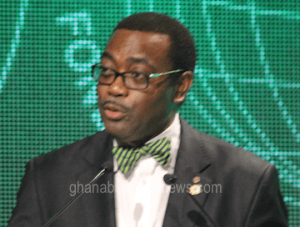AfDB to double climate finance to $25b by 2025 – Adesina

Dr. Akinwumi Adesina, the President of the African Development Bank (AfDB), says the Bank would double its climate finance to $25 billion by 2025.
He adds that Africa’s quest to achieve net zero emission could not be done based on only renewables due to their intermittency.
He said although the continent could boast of abundant renewable energy resources that include solar, hydro, wind and geothermal resources, it needed to combine renewables with natural gas to assure stability and security of energy.
This, he said would also help improve access and affordability, as well as energy security.
“It should be noted that even if Africa triples the use of gas for gas-to-power it will contribute less than 0.67 per cent to global carbon emissions. So, Just Energy Transition must not shortchange Africa’s growth and development, especially stable energy to power its industrialization,” he said.
A just energy transition is a negotiated vision and process centred on dialogue with guiding principles, to change practices in energy production and consumption.
It entails improvement in technology, use of renewable energy as well as societal and institutional change which requires actors to take on new roles.
Speaking at the AfDB Group Annual General Meeting press briefing in Accra, Dr Adesina said the continent, which accounts for just 4 per cent of the global greenhouse gas emissions, was being short-changed by climate finance.
He said the continent was not receiving enough resources to tackle climate change even though climate change induced losses reach between $7 billion to $15 billion annually.
“This is expected to rise to $50 billion a year by 2040… Africa gets only 3 per cent of total global climate finance” he said.
Meanwhile, Africa needs between $1.3 trillion and $1.6 trillion to address climate change by 2030.
Apart from its contribution to fight climate change, the AfDB Group president said the Bank has among other things financed the Noor Ouazazarte in Morocco, the largest concentrated solar power plant in the world as well as the largest wind-power station in sub-Saharan Africa, Lake Turkana in Kenya.
“The Bank is currently investing in developing the $20 billion Desert-to-Power programme in the Sahel, which will develop 10,000 megawatts of solar power systems, that will provide electricity for 250 million people, and turn the Sahel of Africa into the world’s largest solar zone” he said.
Dr Adesina also mentioned that the Bank no longer finances coal but aims to double its climate finance to $25 billion by 2025.
Source: GNA
